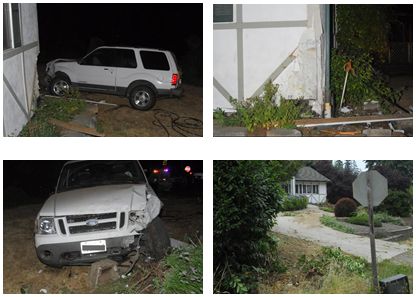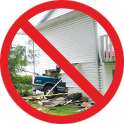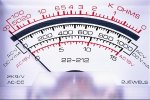Quad-Lock Overcomes Nature's Obstacles in the House on the Hill |
Our latest Project Profile describes the challenges that Quad-Lock was able to overcome to complete this unique hillside project in Colorado.

Read the full Project Profile on the Rock Solid House on the Hill Project.
See Photos of the detailed progress of this project.
|
"How To" Expert Recommends Quad-Lock |
Canadian "How To" expert Shell Busey recommends Quad-Lock in a recent "Ask Shell" article,
Insulated concrete forms the way of the future for new homes. (July 29, 2009)
Read the complete article. |
Introduction to ICFs Webinars |
Quad-Lock's Introduction to ICFs Webinars
are still going strong.
See the complete schedule & register!

"The goal of these webinars is really
education" says DJ, Quad-Lock's Eastern North America Sales
Director. "There is a lot of mis-information out there. Really
all we are trying to do is be helpful to people who are
interested in this building technology - if it helps sell
Quad-Lock, that's great; but the real benefit is boosting the
ICF industry."
During these 1-hour presentations, attendees will
gain:
 A basic understanding of ICF
A basic understanding of ICF
 An understanding of the types
of structures you can build with ICF
An understanding of the types
of structures you can build with ICF
 Knowledge to make a more
informed buying decision
Knowledge to make a more
informed buying decision
 Insight into the Quad-Lock difference
Insight into the Quad-Lock difference
Reserve your seat in one of these upcoming webinars. |
|
Out of Control SUV Rams Into Quad-Lock Home
|
In the early hours of August 7th, 2009, an out of control sports utility vehicle was caught on Ryan Heacock's security camera as it crashed into the side of their home. After losing control coming down a hill and missing the 90 degree turn, the vehicle miraculously missed the family's own vehicle by inches. Then the car went airborne and crashed into their Quad-Lock home, which literally "bounced that Explorer off like a little toy" remarks Ryan Heacock.
View the security camera footage.
There was almost no damage to the home, with the exception of the siding, insulation, and some small chips of the concrete. "I can't imagine what would have happened if this was a wood home!" says Ryan Heacock. The SUV did manage to take out the Heacock's wood handrails, numerous flower pots, landscaping blocks and left a huge amount of debris from its 175 foot journey of destruction.

The Heacock incident is a perfect example of the durability and strength of Quad-Lock & concrete.

Whereas, this is what can happen when your home is not built with Quad-Lock...
View Ryan Heacock's documentary on the scene.
See more photos in our Extended Photo Gallery.
"Cash for Clunkers"
You can't watch the news or pick up the paper without hearing about the United States federal government's program - "Cash for Clunkers". The Car Allowance Rebate System (CARS), colloquially known as "Cash for Clunkers," is a scrappage program intended to provide economic incentives to U.S. residents to purchase a new, more fuel efficient vehicle when trading in a less fuel efficient vehicle. The program was designed to provide stimulus to the economy by boosting auto sales, while putting safer, cleaner and more fuel-efficient vehicles on the roadways. This is part of the economic stimulus package that allows car buyers of more fuel efficient models a $4500 voucher towards the purchase of a new car.
There is quite some debate as to the success of this program and the long-term effects. The reality is saving one gallon of gas per 100 miles driven saves 20 pounds of carbon dioxide, which is approximately one ton of carbon dioxide every 10,000 miles of driving. (You can also save one ton of carbon output per year by adjusting your thermostat by 2 degrees). And of course this does not weigh the carbon output for producing the new vehicles or recycling the old ones.
I do not want to debate this program or be overly political, merely point something out: In the United States, approximately 4 metric tons of carbon dioxide (CO2) is emitted from people's homes. This is equivalent to almost 9,000 pounds per person per year (about 17% of total U.S. emissions). The three main sources of carbon dioxide emissions from homes are heating/cooling, electricity use, and waste. A recent report from the U.S. census has almost 130 million housing units in 2007, of which 86% have a central heating system and 64% have a central air conditioning system.
Can you see where I am headed here? We can have a bigger impact on the environment and stimulate the economy in the building industry by building better insulated homes and businesses and by adding insulation to our existing structures. Where is the building industry's "Cash for Clunkers" program? Way too many of our existing buildings and even our newly built homes are not making the grade. We need to reduce our need for electricity, heating and cooling in our buildings.
Sure, there are rebates and tax incentives for building more energy efficient buildings, but the publicity and mileage (no pun intended) that the "Cash for Clunkers" program has garnered is amazing. And it sounds like the federal government plans on extending this offer as the first one billion in stimulus funds was exhausted in less than 2 weeks. One has to ask, "I wonder, if this has anything to do with the government having ownership in some of these participating automakers?"
Is your home or business a clunker in regards to energy consumption? Are you considering renovating or building new? Don't wait for the government program for the building industry, contact Quad-Lock as we can help stimulate your monthly budget when it comes time to paying your energy bills, all the while reducing carbon output, just like the federal government!
Good Selling,
D.J. Ketelhut
Proven Energy Efficiencies
 As
part of our on-going development of materials to assist in the sale of
Quad-Lock, we want to create a library of statistics about structures
built with Quad-Lock Insulating Concrete Forms. You can help us by
submitting your energy bills, along with the bills from a comparable
house in your neighborhood for us to add to our library. When you do
this Quad-Lock will pay your highest month's
energy bill for your troubles. As
part of our on-going development of materials to assist in the sale of
Quad-Lock, we want to create a library of statistics about structures
built with Quad-Lock Insulating Concrete Forms. You can help us by
submitting your energy bills, along with the bills from a comparable
house in your neighborhood for us to add to our library. When you do
this Quad-Lock will pay your highest month's
energy bill for your troubles.
Contact us for more information.
|
